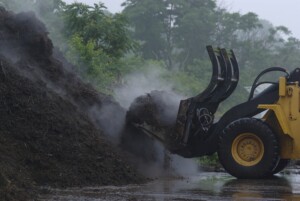 A recently conducted study which focused on the identification and quantification of microplastics in final refined compost found no remains of used EN 13432 certified industrial compostable bioplastics. If correctly composted, their use does not contribute to the increase of microplastic pollution.
A recently conducted study which focused on the identification and quantification of microplastics in final refined compost found no remains of used EN 13432 certified industrial compostable bioplastics. If correctly composted, their use does not contribute to the increase of microplastic pollution.
Microplastics and their potential environmental and health impacts have been of growing concern in recent years. Compost produced from separately collected biowaste, which is increasingly contaminated with conventional plastics, has become a contributor to microplastic pollution as plastic remains can leak into the environment.
Spanish researchers from the University of Alcala and the Universidad Autonoma de Madrid selected and studied the final refined compost of five industrial composting facilities on the peninsula over a five-month period. This also included four materials made from compostable bioplastics certified according to the European Standard EN 13432. The researchers selected two commercial bags from local markets, one wrapping film from a commercial food package, and specimens from the material Mater-Bi supplied by Novamont S.p.A.
Although 10 to 30 plastic items per gram of compost were identified in the analysed samples, none of them were EN 13432 certified compostable plastics. In fact, despite “evidence that compostable plastics arrived in the composting plants at least as biodegradable plastic bags”, there were no traces of compostable plastics after the composting processes, proving the biodegradation of compostable plastics in industrial composting. The tested samples taken from the five composting plants use different collection systems. However, each system included door-to-door collection which ranged from 15 percent to100 percent. The use of compostable bags is encouraged or mandatory. The plant with a 100% door-to-door collection and mandatory use of compostable bags had the lowest concentration of plastic particles in the final compost. The results not only proof that industrial compostable bags biodegrade successfully. They also show that they do not contribute to the problems caused by microplastic pollution.
The debate about the biodegradability of compostable plastics still too often lacks science-based arguments and is distorted by false claims without any scientific proof. Hence, the study is very much welcomed as it further improves the data availableon the performance of compostable plastics. It contributes to the knowledge base of serval other studies that have been published in the past, e.g., by Wageningen University & Research, Witzenhausen Institute, and the University of Bayreuth.
Microplastic pollution is a complex challenge we have to face. There are many areas where biodegradable and compostable plastics can significantly reduce the leakage of persistent non-biodegradable microplastics into the environment. Read in our EUBP position paper “Biodegradable plastics do not cause persistent microplastics” how soil-biodegradable mulch films help to stop leakage and accumulation of persistent microplastics in agricultural soils. It also includes information on how standards support the establishment of biodegradable alternatives to substitute conventional microplastics that are intentionally added to cosmetic products.